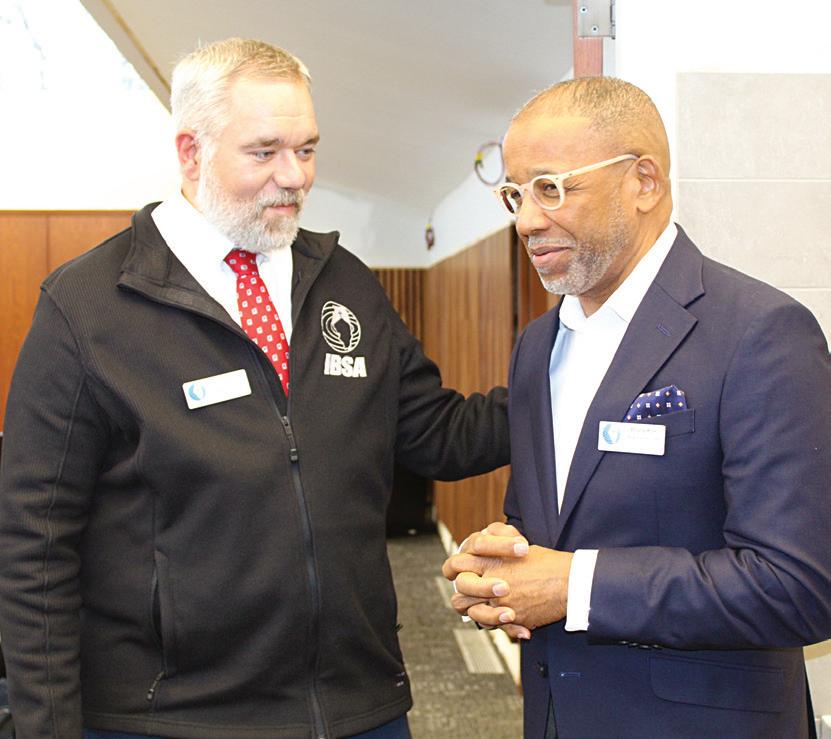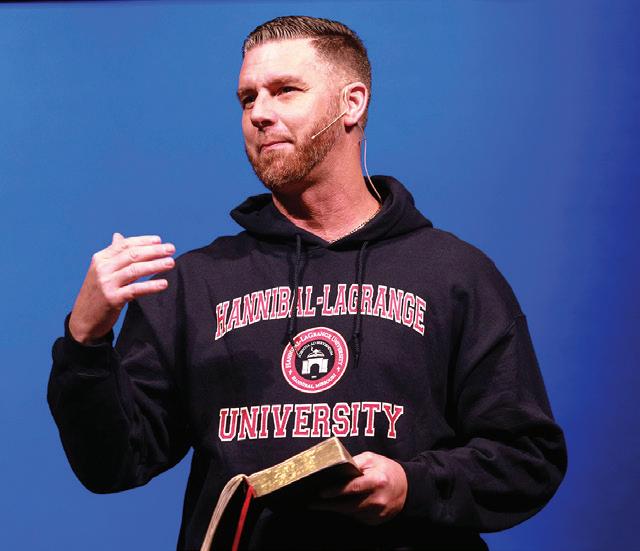
11 minute read
Board celebrates reno reveal

‘Good bones’ in 50-year-old building produce bright gathering space
Advertisement

Springfield | Calling it “our living room for Illinois Baptists,” IBSA Executive Director Nate Adams opened the dedication of a first-floor renovation that has been more than a year in development, but 12 years in the making.




While the IBSA building has multiple small conference areas and a large auditorium, it lacks meeting space for medium-size groups. Beyond the usual staff meetings, at least 50 events including board and committee functions are held in the building each year. The renovation was done to address this need. Leaders who have attended conferences in Springfield may recall the area as the former executive suite, a cluster of five offices and a small kitchen just inside the front door that was largely untouched since the Baptist building was opened in 1971.


The remainder of the facility has been renovated over the past decade, starting with the third floor which became a central hub for IBSA staff who at one point were scattered about the building, and continuing with the remodeling of the first-floor auditorium and conversion of a warren of cubicles and offices into the open floor plan Resource Room and Chapel. That area also doubles as dining. Sprucing up meeting spaces in the basement was mostly completed before the Pandemic, and an update in common areas for tenants who rent space on the second floor left only the old offices of the Executive Director and Communications.


Demolition began in September 2022 followed by construction. Some final touches remain, but the work to adapt the mid-century modern concrete and glass office pod into a gathering area with café seating, board room, and serving kitchen is almost complete. The finished project is expected to come in around $400,000.
IBSA Board President Jeff Logsdon led the March 28 dedication with a reading from Titus 2:1114. He asked God to “use this space to purify people for zealous good work and zealous good deeds.”
“Even if they’re just eating sandwiches,” the pastor of Island City Baptist Church in Wilmington asked that God would “use their conversations in the space for good works.”
IBSA Board Vice President Bruce Kirk, pastor of Alpha Baptist Church in Bolingbrook, led board members and staff in a prayer of repentance and forgiveness. IBSA President and pastor of Cornerstone Church in Marion, Michael Nave added the challenge to make “disciples of those who would make disciples who would spread all over the state.” Nave urged “that this would be the start of revival here.”
The Marist Poll publishes a “Mindset List” about incoming college freshmen each year. Here are some recent highlights for the Classes of 2024-2026.
This generation...
Now between 12 and 26 years old, was mostly born after 9/11 and is entering college in the Covid era
Has lived entirely in the Internet Age, and has a near 100% possession of Smart Phones
Always had Facebook, although they prefer TikTok, Instagram, and Snapchat
Is the first since the “duck and cover” generation of the Cold War to live with the real possibility of world war and global conflict
Knows more about Hillary Clinton’s political involvement than Bill Clinton’s; knows only Vladimir Putin as the leader of Russia
Is starting a poetry renaissance, led by Amanda Gorman at the 2021 presidential inauguration
Talks about “fashion sustainability,” although their consumer choices do not reflect a strong commitment to protecting the environment
Reveres LeBron James, may not know about Michael Jordan other than his shoes, will debate who’s the GOAT.
IN FOCUS
The February revival at Asbury University and several other Christian colleges turned the spotlight on Generation Z in a new way: Can this generation—which is facing into so many challenges to its gender identity, mental health, and spiritual beliefs —be the generation that delivers the message of salvation to a faithless world?

Shane Pruitt, the National Next Gen Director for the North American Mission Board, calls Gen Z the “best evangelists” to other members of Gen Z because “they are passionate about Jesus and their heart is broken over the spiritual lostness of their own generation.”
Here am I, send me Facing problems with flagging faith and mental health, Gen Z’s solution may depend on their own willingness to witness.
The last generation that changed the religious landscape was Baby Boomers, born between 1946 and 1964. The “me generation” was responsible for the hippie-led “Jesus revolution” that began in 1969 in California and swept across the nation, a story told in a new film of the same name. In a sea of drugs, protests, Woodstock, and free love, the young adults who got serious about their faith led many in their generation to faith in Christ.
Generation Z has a lot in common with their long-haired grandparents, the Baby Boomers. The term “generation gap” was coined to describe the difference in beliefs and ways of living held by that age group, born after World War Two, and those that came before it. Gen Z, which is generally represented as those born between 1997 to 2012, represents another gap, one which may even be wider than the gulf that preceded it.

Gen Z has created a host of new pronouns to identify by. This generation doesn’t talk about “finding themselves.” Instead, they label themselves non-binary, say they were assigned the wrong sex at birth, or even identify as an animal. According to the latest Gallup poll, 20.85% of Gen Z identifies as LGBTQ. In the words of the
Who will lead revival? Education Special Section 7 – Photos courtesy HLGU
TikTok ban could impact evangelism
As the social media app TikTok continues to raise security concerns, some churches and ministries would face a significant shift in outreach strategy if Congress bans the platform in the U.S. The app, which allows users to easily create and share videos, is one of the world’s fastest-growing social media platforms, especially among young people.
TikTok has 150 millions users in the U.S. The U.S. has threatened to ban the app here over concerns of spying by the Chinese government. TikTok’s CEO met an angry Congressional committee in March.

While TikTok is best known for viral dances and recipes, Christian leaders use the platform to reach younger audiences: Passion Conferences has more than two million likes on videos of its worship events.

NAMB’s Shane Pruitt encourages deeper discipleship among young people. Cristina Baker started sharing her hope-filled videos during the pandemic and now has more than one million followers on TikTok.
Churches too have begun using the platform to connect with a larger audience. TikTok offers leaders a unique opportunity, Lifeway’s Zac Workun wrote in 2021, to upload short, rewatchable lessons and begin to build community there.
The potential shifts in social media come at a time when churches are enjoying a big advantage across all platforms, said Brady Shearer of Pro Church Tools. For the first time, he said, social media are prioritizing vertical video as the preferred type of post. (TikTok led the trend.) Churches already have a “gold mine” of content for vertical video, Shearer said, because most create a video message every week.
Additionally, social media platforms are moving toward algorithms that point users to new content based on their activity, rather than limiting them to content liked or posted by friends, he noted. That means churches can post the same vertical video on multiple platforms to reach different audiences.
Last year, Pew reported 67% of teens in the U.S. said they use TikTok, and 16% said they use it constantly. Only YouTube has a larger share of teen users.
Continued from P. 7 pop song, this generation is all about being “born this way.”
But the message of Christ runs counter to that message. “Christianity is not something you are born into. It’s something you have to be reborn into,” Pruitt told students at Hannibal-LaGrange University in February. Between the chapel service and a worship event that evening, a few hundred students heard his message and 25 came to Christ.
Pruitt told the Illinois Baptist he believes this generation is more open to the gospel. “I’ve personally seen more young adults, college students, and teenagers make professions of faith in Jesus for salvation in the last three years, than the previous twenty years of ministry combined.”
That’s a good thing because a recent survey by the American Enterprise Institute found more than a third (34%) of the generation are religiously unaffiliated making it the least religious yet.
But Pruitt said Gen Z appears to be “very aware of their sin” and recommends when sharing the gospel with them to “focus on Jesus’ victory over it.”
Pruitt said he doesn’t feel he’s had to adapt his message or method for sharing the gospel to connect with the younger generation. “Of course, certain ‘slang terms’ change over time and more updated illustrations are necessary,” he said. “However, the Bible doesn’t change, the Holy Spirit doesn’t change, and the gospel doesn’t change. We’ll be at our best when we stick to what has worked for 2,000 years.”
He believes “focusing on the truth that Jesus can do for you what you can’t do for yourself is very intriguing. Life, Cross, Resurrection. They’ve been told self-help nonsense their whole life, and they’re realizing that it doesn’t solve spiritual problems.”
The key is “when we help them realize the gospel isn’t more selfhelp… they’ll relate to it. When self is the problem, self can’t be the solution. We need Someone outside of self, His name is JESUS.”
Pruitt says it is important church leaders recognize “Christian young adults and teenagers are not the ‘future of the church.’ If they know Jesus, then they are the church of today.”
Fertile ground on campus
Kevin Jones, IBSA’s state director of church planting, agrees. He says church leaders can trust members of Gen Z to start using the skills they already have, especially in the area of technology, and letting them get involved in areas of leadership. “You can have students running social media, planning events, and leading worship. All these things are available and accessible to them. There’s a leadership vacuum that they’re just waiting to fill.”
Students also have ideas related to new technology, such as social media, that leaders from previous generations “may not have thought of or be familiar with,” he noted.
Jones acknowledges some church leaders may prefer students “mature more until leadership roles are accessible.” He suggests those with “years of experience” develop mentoring relationships with students to get them started in leadership.
To help get over a technological communication gap, Jones says one of the best ways of communicating with students is texting with them. “Showing that you care is learning their technology.” He woman who became actively involved with student work through New City Church after becoming a Christian. “She helped disciple girls and you saw her life being lived out for Jesus constantly.” She is now in Mexico serving as a missionary.

Gen Z wants to see authenticity and that carries over into the way they are discipled by leaders in the church. Stories such as that student who answered the call to missions illustrate the type of authenticity they seek. “They can sniff out a fake,” said Jones. “If they don’t see us living out our lives for the Lord, they know it’s just an empty claim and they don’t want to follow fakes.
“It’s simple,” Jones said, “if you live out your Christian walk they will too.”
Pruitt also stresses the importance of discipling Gen Zers “to lead them to live on mission now pointed out most young adults prefer using their phones to text rather talk. “Texting is a conversation to them unlike with previous generations,” he said.
Students need our encouragement and to hear the truth, Jones urged. “If we claim to live by the Bible, our theology should match that. If we give them leadership opportunities, help coach them. They’re wanting someone to help guide them. Challenge them to be leaders now.”
IBSA currently has seven leaders on contract across the state working with campus church plants and is providing evangelism training through those plants, including SALT Church in Bloomington, Metro Community Church in Edwardsville, and New City Church in Champaign. Jones said he is working to train 1,000 students in evangelism each year for the next ten years.
Jones told about one young and influence their friends with the gospel now.”
Much has been made recently in the media regarding the mental health issues Gen Z is facing. Many are placing the blame on the pandemic and the social isolation it created. In March, the World Health Organization released a study claiming that in the three years since the start of the pandemic, there’s been a 25% increase in the prevalence of anxiety and depression worldwide.
However, Pruitt believes there’s more behind the problem. “The pandemic didn’t necessarily create new problems with Gen Z,” he said. “It just poured gasoline on the problems that were already rampant in that generation. Gen Z is realizing at a much earlier age that the world is broken, and that they’re broken.”
The up-and-coming generation may only be reaping the harvest sown by those who preceded them, including Gen X and Millennials. “They are the refugees of the sexual revolution,” Jones stated. “They are getting bombarded with the ultimate end goal of what the sexual revolution has become.”
Their brokenness is why Pruitt thinks the generation’s rates for depression, suicide, and anxiety have increased and has caused many to begin looking for hope, answers, and the truth. “That is where we (the church) get to slide in with the gospel and say that hope has a Name,” he said, “The answer has a Name, and truth has a Name—JESUS!”
Faith can make a big difference on a young person’s mental health. A recent survey by Springtide Research Institute found 73% of religious young people agreed “that their religious and spiritual practices positively impact their mental health,” while 66% of religious young people agreed “their religious or spiritual life matters for their mental health.”
Pointing to the 2023 Asbury Revival that mirrored the 1970 outpouring of the Spirit at Asbury and spread across the nation, Pruitt indicated he’s hopeful it will continue. He characterized the weeks of prayer as renewal with “no screens, movie clips, fancy lights, fog machines, stage props, production meetings, planning centers, branding, promotional strategies, or ‘big names.’” He called it “just a lot of Holy Spirit, gospel, Scripture, confession, and repentance. He hopes it continues. At HLGU, as at his preaching engagements across the nation, Pruitt urged students to pray that God will spark revival in their hearts.

“Our nation needs revival. Our nation will not see revival until our churches see revival,” said Pruitt. “Our churches will not see revival until the individuals in our churches see revival.”
And as revival often starts with young people, it can begin today with Gen Z.

Serving beyond ‘the bubble’
Christian colleges offer pivotal training ground for new leaders
Listen to enough college students and you’ll hear it—a nickname for their school that is equal parts affectionate and sarcastic. “It’s a bubble,” they say, calling to mind a giant transparent dome covering stately stone buildings and a leafy quad. What they mean is that colleges—especially Christian universities—protect their students in a way that is comforting for four years but might not prepare them for the harsh realities outside.
“One of the fears students have in choosing Christian education is that they’re choosing to be in a bubble,” said Matt Dearden. “But as they start exploring and looking around, what becomes really obvious is that every college is a bubble. It just depends what kind of bubble you want to be in.”
Dearden is associate vice president of enrollment at Cedarville University in southwest Ohio. It’s one of the Christian universities taking seriously the mission to shepherd students during their integral college years. New research from Barna shows just how pivotal those years are: according to an extensive study on Gen Z, 32% of U.S. teenagers ages 13-17 identify as “committed Christians” and say they have made a personal commitment to follow Jesus Christ.
But that number falls to 17% among Americans ages 18-22, indicating what may be a sharp drop










